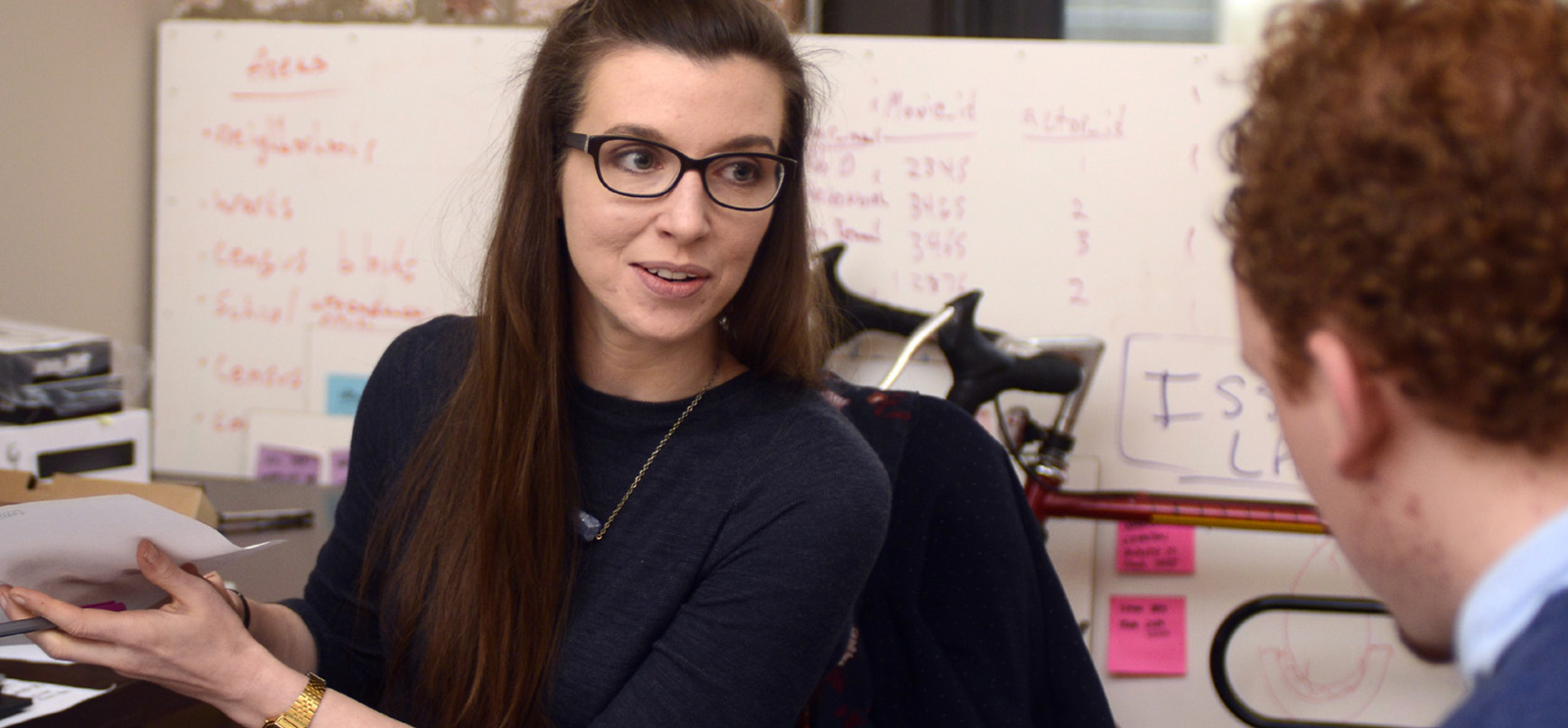
Psychology alumna turned data scientist Laurie Skelly says she learned how words and pictures can communicate sophisticated ideas in a digestible and memorable way. (Photography by Michael Schmidt/Chicago Sun-Times)
The path more and more traveled
The Division of the Social Sciences helps graduate students find their place—inside and outside of academia.
Laurie Skelly, AM’09, PhD’12, had dreamed of a career in neuroscience since age 15. But when she reached the end of her graduate training in psychology at the University of Chicago, she faced what she calls “a crisis of motivation.”
Skelly knew it was time to look for a job outside the academy, even if she wasn’t quite sure how. “There’s a sea of people doing cool stuff, and I should go find a place in it,” she told herself.
After several months of networking events and what she jokingly describes as “basically stalking,” Skelly found a position as a data scientist with the consulting firm Datascope Analytics—a job she saw as a perfect fit.
Skelly is one of an increasing number of alumni who follow a path from graduate school to a career outside the academy. To help such students develop the necessary skills, the Division has strengthened its arsenal of resources.
Through its Emerging Leaders Initiative, started in fall 2013, the Division provides professional development events and internships in a variety of industries. These offerings supplement programs in each department, such as a new Mellon Foundation–supported career program in the Department of History.
Emerging Leaders signals to graduate students that the Division supports students seeking a nonacademic career, says Kelly Pollock, associate dean of students in the Division. “It’s in everybody’s best interests that our students have great careers, whatever those careers are.”
According to Pollock, a main goal of the program is to help students realize they already have skills prized by employers. With their teaching, writing, and research abilities—and being able to manage a major project like a dissertation—graduate students are often more prepared for the job market than they realize.
Alumni supported that message at an Emerging Leaders event, now in its third year, this past May. At Charting Your Own Path: Career Diversity for Social Scientists, Social Sciences alumni recalled their paths from graduate school to nonacademic careers.
When applying for jobs, John Balz, AM’07, PhD’10, found it helpful to “look at my dissertation through the lens of project management.” It was proof to employers he could finish a major undertaking “on budget and on time.” Today Balz is head of planning for the digital marketing firm VML.
John Kenny, PhD’00, studied political science before moving to advertising. As chief strategy officer at FCB Chicago, he has examined consumer trends from dieting to beer to frozen pizza. And while changes in beer consumption may not seem to have much in common with mobilizing diasporas in nationalist conflicts—the subject of his UChicago dissertation—he says the mindset is remarkably similar.
“One benefit of graduate training was being able to look at familiar phenomena and question traditional approaches to understanding them and finding a newer, maybe more interesting approach,” he explains. “That definitely has been a huge overlap.”
Similarly, Skelly’s psychology background helped her as a data scientist. “The research arc of what I do is almost exactly the same,” she says. In both fields, “we start out with a question that’s on a human-relatable level.” A team then works together to tackle the problem through “intensely technical middle ground.”
Getting a foot in a company’s door can take time. Skelly recommends developing a robust online presence and attending networking events for industries that seem intriguing.
Kavita Kapadia Matsko, AM’04, PhD’07, received her degree in sociology and now works at the Urban Education Institute. Today she’s often on the other side of job searches and regularly meets doctoral students for informational interviews. She says these informal conversations are valuable—and not just because they can expand job seekers’ professional networks.
“Having to go through the process of explaining who you are, what you care about, and what you see yourself doing next over and over again is really powerful,” she says. The process helps to “clarify for yourself what it is you’re drawn to and what you want to do.”
Looking back on her career path, Skelly wishes she had realized sooner how valuable her expertise was. She advises graduate students not to lose confidence: “You’re so much more talented than you think you are.”
For Kenny, “the biggest challenges in the business world—regardless of what area of the business world you go into—are ultimately intellectual challenges. The skills that you’ve developed for tackling the biggest intellectual challenges in academia serve you well for tackling any intellectual issue in the world of business.”
